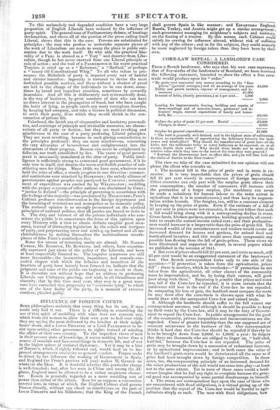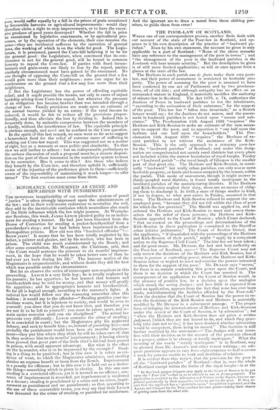CORN-LAW REPEAL: A LANDLORD'S CASE CONSIDERED.
FROM a Scotch landowner, who says that his own case represents that of five-sixths of the landowners of Scotland, we have received the following statement, intended to show the effect a free corn- trade would produce upon his " order."
" By Fain-rent converted into money according to the " Sara prices," (general averages,) and on an average of ten years £4,000 Public and parish burdens, expense of management, and in- surances £1,000 Interest of debts, (family provisions,) at 4 per cent 1,000 2,000 Leaving for improvements, fencing, building and repairs of farm-steadings and of mansion-house, gardeners' and la- bourers' wages, current expenditure of family and house- hold, &c £2,000 Reduce the price of grain 25 per cent. Rental £3,000 Charges, as above 2,000 Surplus for general expenditure £1,000
" The land is generally well drained, and in the highest state of cultivation. Is there no equitable mode of apportioning the deficiency between the land- owner and bondholder? Why should the manufacturer of grain have all the kicks, and the millionaire twice as many halfpence as he expected, or, at all events, double their value ? Why should these bonds not be made nf the relative value which they bore to the land at the time they were granted ?
" Instruct the Government how to effect this, and you will thus hold out the scales of Justice to the Free-traders."
The view we take of the case submitted for our opinion will not please the client who consults us.
1. The assumed fall in the price of grain and in rents is ex- cessive. It is very improbable that the prices of grain should fall 25 per cent merely in consequence of foreign importation. Other countries can only part with the surplus grain above their own consumption ; the number of consumers will increase with the production of a larger surplus, (for machinery can never be made a substitute for human labour to the same extent in agriculture that it is in manufactures,) and thus keep its augmen- tation within bounds. The freights, too, will be a constant element in keeping up the price of grain. Even if the estimate of a fall of 25 per cent in prices were not excessive, it does not follow that such a fall would bring along with it a corresponding decline in rents. Grass-lands, kitchen-gardens, quarries, building-grounds, all contri- bute to create the annual income called rent ; and their productive- ness would increase in a larger ratio than the price of grain fell. The increased wealth of the manufacturers and traders would create an increased demand for houses and gardens, for animal food and horticultural luxuries ; and this would more than compensate any possible loss flowing from the fall of grain-prices. These views we have illustrated and supported in detail, in several papers which we published in the autumn of 1841.
2. But even if prices should fall 25 per cent, and rents as much, still 25 per cent would be an exaggerated statement of the landowner's loss. Our Scotch correspondent looks only to one side of the question—" If protection is taken from the agriculturist, prices fall" : there is another, which he overlooks—" If protection be not taken from the agriculturist, all other classes of the community must be impoverished, and he, by losing their custom, will grow poor along with them." Supposing it possible that prices and rents may fall if the Corn-law be repealed, it is more certain that the landowner will lose in the end if the Corn-law be not repealed. In computing his loss or gain, the landlord must compare the rents he may draw after the corn-trade is thrown open with what he would draw with the unrepealed Corn-law and ruined trade.
3. Although the landlords should suffer to the full extent our correspondent assumes, and although it should be possible to -keep up their rents by the Corn-law, still it may be the duty of Govern- ment to repeal the Corn-law. In public arrangements for the good of the community, private inequalities and inconveniences are dis- regarded. Cases of greater hardship than the one supposed are of constant occurrence in the business of life. Our correspondent thinks it hard that the Corn-law should be repealed if thereby he is to be brought down from 2,0001. to 1,0001. a year: he forgets that there are thousands who are obliged to linger on, " half-clad, half-fed," because the Corn-law is not repealed. The price of grain may be brought down by a succession of redundant harvests, or by agricultural improvements; and in both cases the value of the landlord's grain-rents would be deteriorated all the same as if price had been brought down by foreign competition. . In these cases, too, the compensating principle of an increased demand for the other productions of the soil would not come into play—at least not to the same extent. Yet in none of these cases would a land- owner imagine that he had any right to complain because the gene- ral good was accompanied by some partial disadvantage to himself. 4. The stress our correspondent lays upon the case of those who are encumbered with fixed obligations, is a virtual giving up of the position that the repeal of the Corn-law would be hurtful to agri- culturists simply as such. The men with fixed obligations, how
ever, would suffer equally by a fall in the prices of grain occasioned by favourable harvests or agricultural improvements : would they therefore claim a right to stop improvements, or to have the exces. sive produce of good years destroyed? Whether the fall in price be occasioned by legislative enactments, or by agricultural pro- cesses, or by the operation of the elements, their case remains the same—they are incidental sufferers by the operation of general laws, the working of which is on the whole for good. The Legis- lature, it is presumed, passed the Corn-bill believing it to be for the general good : the Legislature, when convinced that its con- tinuance is not for the general good, will be bound in common honesty to repeal the Corn-law. If parties with fixed incum- brances and grain-rents are likely to lose by the repeal, parties similarly circumstanced must have gained by the enactment. No one thought of opposing the Corn-bill on the ground that a few would gain more than their neighbours : none can argue for its continuance on the ground that a few may lose more than their neighbours. 5. But the Legislature has the power of affording equitable relief; and it might provide the means, not only in cases of unjust hardship arising from Corn-law repeal, but wherever the pressure of an obligation has become heavier than was intended through a change of law. Family provisions are made upon an estimate of the annual income yielded by an estate : if the total income be reduced, it would be fair to reduce all the provisions propor- tionally, and thus alleviate the loss by dividing it. Indeed this is frequently done, by amicable compromise between the members of a family, without the interference of law. The equitable principle is obvious enough, and need not be confined to the Corn question.
In the spirit of this last remark, we once went so far as to suggest a benevolent fund for the relief of extreme cases of suffering in working out Corn-law repeal. This was suggested not as a matter of right, but as a measure at once politic and charitable. To that view we still incline to adhere : but an indispensable preliminary to the serious discussion of such a proposal must be, a sincere disposi- tion on the part of those interested in the restrictive system to treat for its surrender. Has it come to this ? Are those who believe they benefit by the Corn-law, and therefore uphold it, sufficiently aware of the injustice of the preference given to them—sufficiently aware of the impossibility of maintaining it much longer—to offer terms? The first overture must come from them.























 Previous page
Previous page